How will you be receiving your presents this year - a CD, a voucher for iTunes or maybe even a Spotify membership? In 2014, streaming services made more money than CD sales for the first time ever and that trend is continuing. But it's not just the distribution of music that is changing; how musicians make music is also evolving rapidly. This week, we explore the influence of technology on one of mankind's oldest traditions - the art of music making. Plus in the news, the global response to climate change, the mystery of missing starlings and how delightful really is that red sky at night?
In this episode
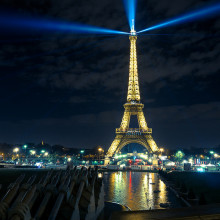
01:13 - Politics of climate change
Politics of climate change
with Dr Julian Huppert, University of Cambridge
This week, representatives from more than 190 nations have been gathering in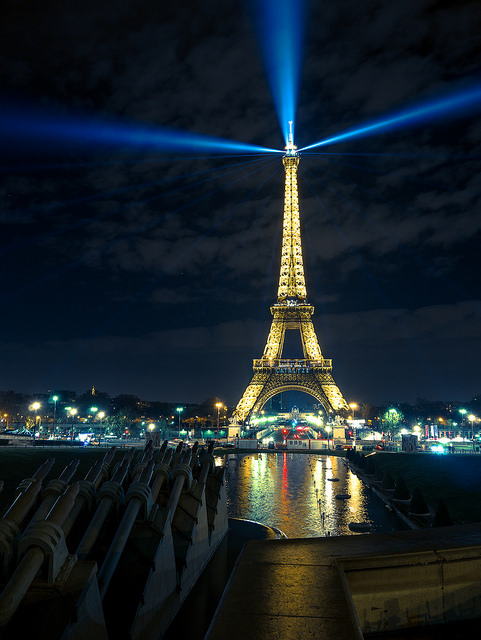 Paris to participate in the 21st Conference of the Parties (COP21) and at the top of the agenda is climate change. The aim is to pull together a binding political agreement that everyone signs up to and which will limit future global temperature increases. But what are the chances of this working? And what challenges will politicians face in trying to implement the sorts of strategies that are going to be necessary to keep a lid on climate change. Chris Smith went to speak with Cambridge University's Julian Huppert, who - as well as being a scientist - is a former member of parliament who has campaigned previously on environmental issues...
Paris to participate in the 21st Conference of the Parties (COP21) and at the top of the agenda is climate change. The aim is to pull together a binding political agreement that everyone signs up to and which will limit future global temperature increases. But what are the chances of this working? And what challenges will politicians face in trying to implement the sorts of strategies that are going to be necessary to keep a lid on climate change. Chris Smith went to speak with Cambridge University's Julian Huppert, who - as well as being a scientist - is a former member of parliament who has campaigned previously on environmental issues...
Julian - Well what we have in Paris is the conference of the parties; all the players from around the world, governments, non-governmental organisations, coming together to try to work out what the options are to limit carbon emissions to try to make sure that we don't see warming of more than 2 degrees. This is a slightly arbitrary figure; we know that 2 degrees is harmful but it now seems almost impossible to achieve no change at all, so 2 degrees, I guess is bad, but not too bad.
Chris - What actually is it going to take do this? Is it even feasible? It's one things getting people round a table, are they actually going to achieve anything?
Julian - I think if you look at the history of all of these, one has to be somewhat sceptical about the long term achievements. Some of these conferences have been successful, some less so. I don't think there's an option to say we can't do it. Nobody has a better way of achieving global change by getting global organisations to work together. It's hard to get people together on something like this and there are a number of particular challenges for climate change. One is it's very hard to see it directly; people can't immediately see what's happening; it's a long term programme and it takes long term action to achieve a solution. There's nothing we can do that will fix things by tomorrow or undo the damage that's already been done. That makes it a really, really tricky political problem because it's all the things politicians wouldn't want; it's fairly intangible, it's very, very long term; it's very hard to bring things back to where they want to be, and it relies a lot on people trusting things they can't actually see for themselves directly.
Chris - It's outside the political cycle isn't it because in Britain we vote every five years, in Australia every four years? The consequence of that is that people are looking at short term things that will win them the next election. Not necessarily giving people a hole in their pocket in order to look at something 100 years hence.
Julian - There's certainly an element of that and politics is perhaps better than it's sometimes portrayed at looking at longer term issues, but they tend to be thing where people immediately are aware. So there has been some useful work outside of the political cycle looking at the care system in the UK for example, because it's not hard for people to understand that people are getting older; their parents, grandparents, neighbours, whatever it might be, will be getting older, will need help.. The problem with climate change is that you can look out of your window and not really notice it. That doesn't mean it's not real, it really is there, but it's less obviously there and that makes it harder for politicians to pick up but it is also the fact that it's just a very, very long term issue.
Chris - Recently we've seen the Premier in India saying "we are going to open a new coal fired power station on roughly a monthly basis for many years to come, and we're going to do that because we need to. At the same time you guys, you've had your cake and eaten it you developed countries, so if you've got a problem with what we're doing, you sort it out." How do we deal with that?
Julian - I mean it's a very frustrating attitude but I can understand why. It certainly isn't right for us to say look we've got all the power that we need. Frankly people in the UK, for example, generally getting power is not a challenge for most people. Very hard to say to a country like India, no I'm sorry you can't do this. I think part of the shame is we haven't done enough, early enough to provide really good alternatives. I don't think India would be interested in going ahead with coal fired power stations if we had really good solutions; you know better solar panels, better wind turbines, at an affordable price.
Chris - One of the points that David Attenborough was making in Paris was we should get the scientists round the world who know how to deal with this problem, technologically speaking, together and just throw them at the problem and actually facilitate that interaction, so there is a tangible carbon neutral solution to the energy crisis we face.
Julian - I don't think it's as simple as that. The problem is working out how to actually make this happen, how to actually get the governmental buy in to do things - some of this will involve investment; how to get community based buy in if we're talking about getting people to, for example, save energy emissions by not travelling to work as often. You know a huge effect in the UK on congestion on air pollution, as well as on carbon emissions. If people even could work from home on average one day a week, that involves much more community based human change and I don't think a bunch of scientists in their stereotypical ivory tower saying "ah ha, we have the answer," is likely to get implemented. We are not really short of ideas on how to reduce energy usage; we're not really short of ideas on how to generate energy, the problems are about economics, about the societal impact, about making it actually happen.
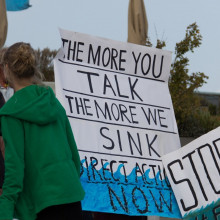
06:31 - Climate change: power to the people
Climate change: power to the people
with Professor Karen O'Brien, University of Oslo
According to the University of Oslo's Karen O'Brien, who has penned a paper this 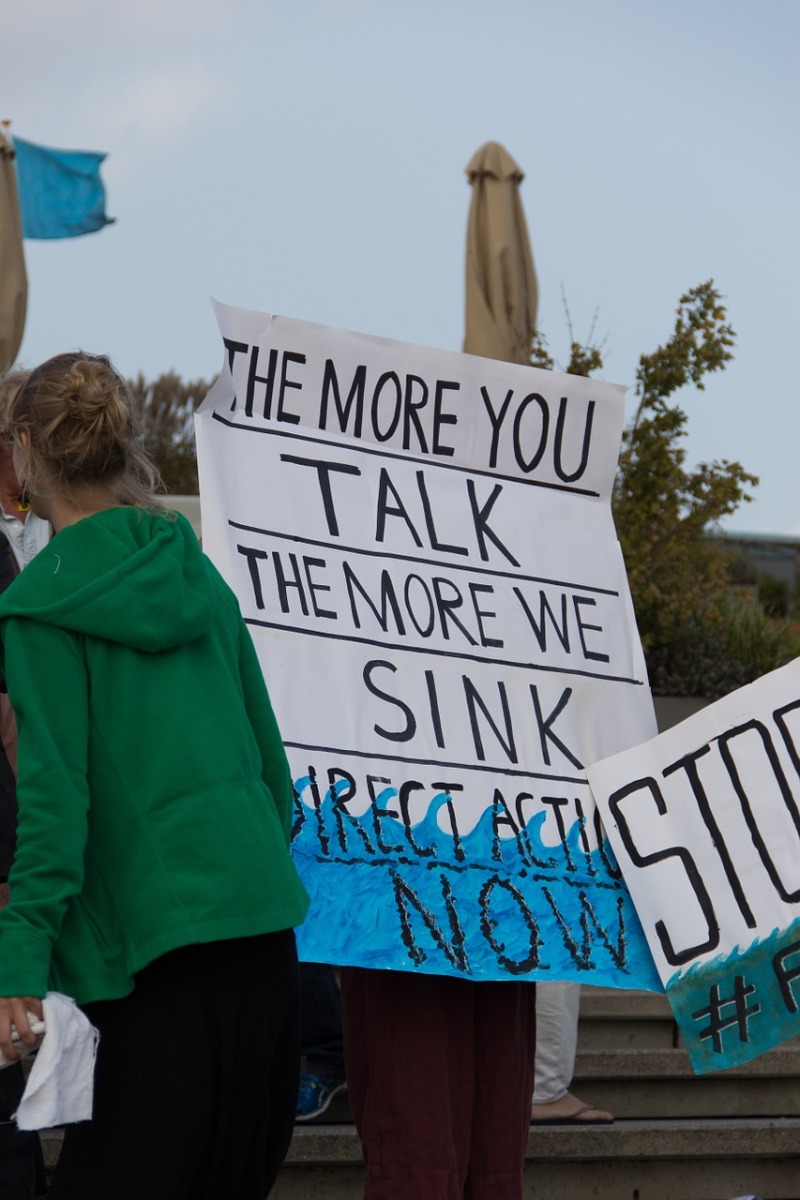 week in the journal Science on what's needed to avert climate change, "an agreement by itself does not guarantee action and desirable outcomes, and current pledges are far from sufficient to limit warming to 2°C. Nor are new technologies and energy infrastructure. Meeting this ambitious target and adapting to the impacts and risks associated with a warmer world will require transformations of a scope, magnitude, speed, and penetration that are unprecedented in human history. Chris Smith asks, without an instruction manual, where do we begin?...
week in the journal Science on what's needed to avert climate change, "an agreement by itself does not guarantee action and desirable outcomes, and current pledges are far from sufficient to limit warming to 2°C. Nor are new technologies and energy infrastructure. Meeting this ambitious target and adapting to the impacts and risks associated with a warmer world will require transformations of a scope, magnitude, speed, and penetration that are unprecedented in human history. Chris Smith asks, without an instruction manual, where do we begin?...
Karen - Paris is a really important and exciting moment in history for getting people together on climate change, but I think we are heading in the wrong direction because we are looking at climate change as if it's just a problem about CO2. The real problem is a human problem, it's a social problem; it's about development; it's about how we relate to ourselves and relate to each other and to the environment. Putting climate change in a separate environmental box actually misses all these connections with economic changes and globalisation with social and cultural changes, and so by focussing just on carbon dioxide as the issue, and there's no doubt that that's important, we forget that it's really about our consumption; it's about the way we've been using resources and of course energy, and it's about how we organise society.
Chris - So what's it going to take then to turn this ship around because we always say climate change is a bit like an oil tanker steaming at very high speed in towards the shore, even if you turn the engines off a mile off shore, it's still moving by the time the dock looms into view.
Karen - Behind every ship there's a small rudder called a trim tab and when you push that in the opposite direction, it pushes the whole ship in the direction that you want to go, and those small trim tab moves; those little changes can actually have big changes and, for me, the real solutions to climate change are going to lie in humans. In people expressing their political agency and not just changing their behaviours but actually challenging the way things are, and starting to say hey I can make a difference.
Chris - So have you've got a list of points that you're making in the paper that you're publishing this week where you're saying, look I think this is what needs to happen. This is the only way we're really going to solve this. We need the politician; we need Paris but at the same time we need societal change in the following ways and this is what I think is important?
Karen - Well the point I'm really making in the paper is that political agency matters. A lot of people point to individuals and say oh you know; walk to work; don't use plastic bags; don't eat meat and things, and that may be important also but individuals have influence, they have influence in whatever arena they're active in, and engaged in. They can actually change things, they can challenge systems and the structures that are contributing. My point really is, is that we need a different type of understanding of political agency that's wider, that lets people feel like small changes that they make actually make a much wider difference. But also a deeper understanding of political agency where we start to really question all our assumptions that we have about our own power, our own possibilities for influencing the future.
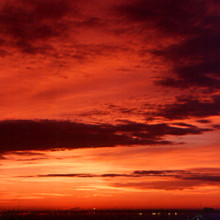
09:54 - Should we delight in a red sky at night?
Should we delight in a red sky at night?
with Dr Kat Arney, The Naked Scientists
Kat's been keeping a weather eye on the sky, for this week's mythconception ...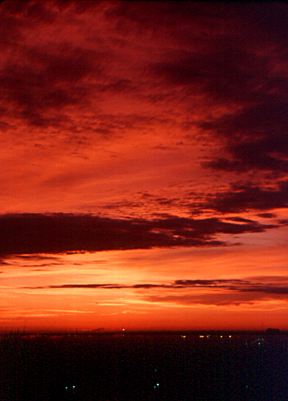
Kat - You've probably heard the old saying "Red sky at night - shepherd's delight; red sky in the morning - shepherd's warning" - although in the US they substitute sailors for shepherds - but is it true?
It's certainly old, as the phrase dates back to at least biblical times. In the book of Matthew, Jesus is quoted as saying "When it is evening, ye say, 'It will be fair weather for the sky is red.' And in the morning, 'It will be foul weather today, for the sky is red and lowering.'" And many of us will probably have gazed at a glowing sunset and murmured the phrase, hoping for a nice day tomorrow, or woken up to a fiery sky and wondered where we put the umbrella.
So what makes the sky turn red in the morning or evening, and does it really reflect the weather to follow? Red skies happen because of the way that molecules of gas and other particles in the atmosphere scatter light. When a beam of white sunlight hits the atmosphere, the shortest wavelengths - blues and purples - get bounced around more easily, pinging off tiny molecules of oxygen and nitrogen in the atmosphere. This is why the sky looks blue during the daytime, because the sun is directly overhead and the blue light is getting scattered all around the sky.
But in the evening and in the morning, when the sun is low in the sky, the light takes a longer path through the atmosphere to get to us. Only the longer wavelength red and orange light get to our eyes on the ground, as the shorter wavelength blue light has already been scattered away. But as any weather-watcher knows, we don't get glorious glowing sunrises and sunsets every single day. And there are a few things that determine whether our shepherds or sailors will be happy or not on any given morning or evening.
To see a red sky at night, or a red sunrise, you need to be able to perceive the light from the sun from the ground. This is, obviously, easier if there aren't any clouds, or if the clouds are high in the sky. And these high clouds (or no clouds) tend to be associated with good weather. But they can also be a forerunner of rain - so you might not notice if it rains during the night after a red sunset, but you'll notice if it tips it down during the day.
Furthermore, high atmospheric pressure - associated with good weather - tends to trap small blue light-scattering particles of dust and pollution. Because weather systems tend to travel from west to east, particularly around the kind of mid-latitudes of the globe like the UK, a red sky as the sun sets in the west means that high pressure - and good weather - is moving in from the west. But if it's already headed over to the east, illuminated by the rising sun, the weather system has moved on and is on its way out, making way for wet and windy low pressure. But this isn't an absolute guarantee, as weather systems can move from south to north, which means that the prediction doesn't work.
Finally, it's often also said that dust and air pollution make sunsets more dramatic, and up to a point this is true, as the small particles scatter short wavelength blue light and leave the red to glow through. But large particles of pollution in the lower atmosphere tend to absorb and scatter all frequencies of light equally, so they actually tend to mute and muddy the colours rather than enhancing them.
So next time you're staring at a romantic sunset, you can turn to your loved one and whisper "Red sky at night, shepherd's delight, but only if the weather is right."
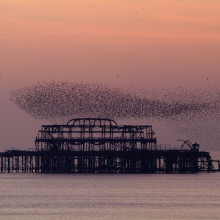
13:12 - The mystery of missing starlings
The mystery of missing starlings
with Dr Becki Lawson, Zoological Society of London, Dr Rob Robinson, British Trust for Ornithology
Starlings are a type of bird; they're found across the world and they're famous for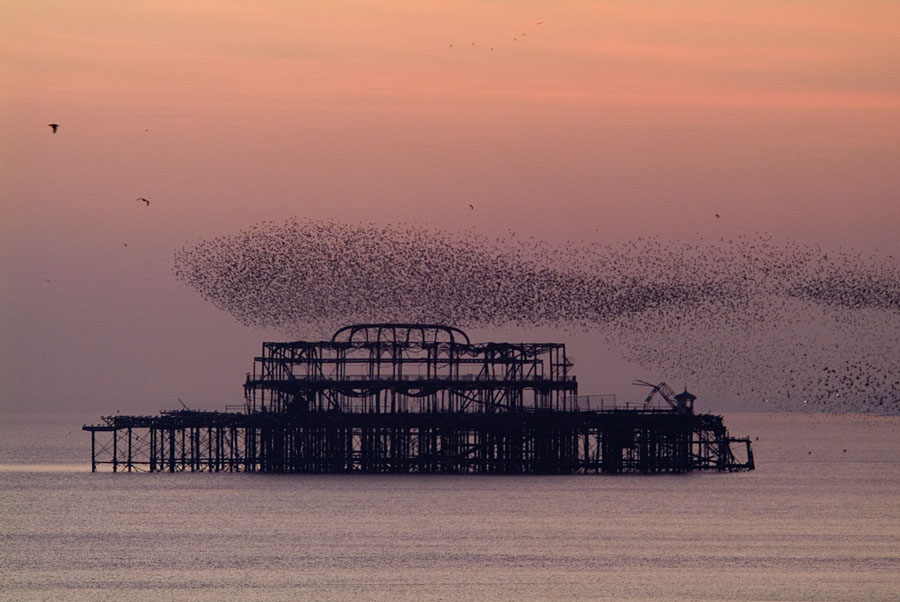 murmurations - you might have seen video footage where thousands of them flock together in a mass acrobatic routine. But the numbers of these birds have nosedived, and recently, drowning has emerged as one mysterious cause of death among the species. Graihagh Jackson has been looking into the phenomenon...
murmurations - you might have seen video footage where thousands of them flock together in a mass acrobatic routine. But the numbers of these birds have nosedived, and recently, drowning has emerged as one mysterious cause of death among the species. Graihagh Jackson has been looking into the phenomenon...
Graihagh - This is the song of a common starling. Starlings are found across the UK. You might recognise them in fact. They look like they've been dipped in oil as their glossy black coats shimmer with metallic greens, and blues, and purples and, to top it off, it looks likes someone's taken a fountain pen and flicked white ink all over them. Thier plumage isn't the only beautiful think about them though. I showed the Naked Scientist in the office a video of what's known as a 'starling murmuration.'
Rob - Sometimes, you can just stumble on them. In Norwich, for instance, I was waiting for the train one evening and above the station I suddenly saw three or four thousand starlings flying over my head which was really quite magical.
Graihagh - Rob Robbins there, from the British Trust of Ornithology.
Rob - Murmurations occur just before dark and the starlings have been out in the fields; they've been foraging probably on leather jackets, earth worms and...
Graihagh - Leather jackets?
Rob - Leather jackets, which are baby crane flies...
Graihagh - Okay, not the item of clothing you wear?
Rob - Not the item of clothing that you wear - no. So they've been foraging hard all day and basically at night they gather together in big roosts. And some of these roosts can be 10, 20 50 thousand birds or sometimes even larger and when you have all of these birds flying up and down together it can be quite a spectacle.
Graihagh - Although they do flock on mass, these birds are actually declining?
Rob - Yes, they have been in terrible trouble over the last 25 years. They've declined by something like 80 or 90% over the last 25 years.
Graihagh - 80 or 90% is a frightening rate of decline. But why is this happening? A recent report found drowning as a mysterious cause of mass mortality among starlings. Drowning is an unusual cause of death as Becki Lawson from the Zoological Society of London explained.
Becki - No, drowning's certainly not a common cause of death in wild birds, but it certainly has been recorded, in particular in birds of prey.
Graihagh - So why have starlings been drowning? Becki did a post-mortem to see if there were any signs of toxins, viruses or parasites that might have caused them to become confused or extra thirsty.
Becki - So when we undertake a post-mortem we take a systematic approach. We examine each of the body systems in turn - we look at them with the naked eye and we also take tissues and look at them under the microscope.
Graihagh - And in a suspected drowning, what would you be looking for?
Becki - Drownings are really quite a challenging diagnosis to make, particularly when we're dealing with wild animals when we're not able to examine them very soon after these events have occurred. So it's a process of illumination, trying to look at all the findings together and exclude suggestions of important infectious disease or toxins and if none of those were present, as was the case here, we think that evidence points to them having drowned.
Graihagh - So there wasn't any evidence of anything in their blood or on the slides in their cells that suggested that it could have been poison that had made them drown?
Becki - We found no evidence of presence of any of the pesticides that were screened for.
Graihagh - And no virus either?
Becki - No, no viruses.
Graihagh - So what could have caused these birds to drown?
Becki - Well we think the cause is most likely related to the behaviour of starlings. When we think of them, we often imagine them in groups and so if they were to enter a body of water together as a group, that might be the simple explanation of why the drown in multiple numbers. And second, it's most commonly involved youngsters - juvenile birds - and so there's probably an element of juvenile inexperience in identifying these water hazards.
Graihagh - Are the numbers of these starlings drowning significant enough to be causing their decline?
Becki - No. I don't think so.
Graihagh - If the numbers aren't high enough to be causing the starling decline, why are they declining? Rob Robinson again.
Rob - I think there's a number of reasons for that and I think they fall into two main groups. Many starlings are foraging in farmland habitats and there have been large scale changes in farming practice over the last 20 or 30 years, so there's less foraging habitat for starlings, and then I think also there are things going on in towns and cities. And there's a couple of things going on there, one of which is in terms of people developing gardens and not leaving the weedy corners, and the other thing is starlings nest in halls. They are cavity nesters and traditionally they would have nested under the eaves of houses or in barns and, obviously, people prefer not to have birds scrabbling around in their loft spaces so they're blocking up the eaves and putting in plastic soffits. So basically the starlings are being deprived of nesting opportunities as well.
Graihagh - Given that it's so many factors, how do you go about tackling that?
Rob - The BTO has been working quite hard to look at ways of influencing agricultural policy but I think practically people can do simple things by putting up nest boxes for a start and then you get to enjoy their antics without being disturbed at night.
Graihagh - Your own private display.
Rob - Indeed.
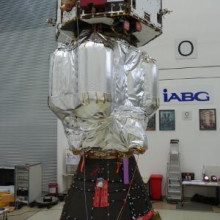
19:30 - Launching e-LISA the gravity spotter
Launching e-LISA the gravity spotter
with Dr Harry Ward, The University of Glasgow
Last week marked 100 years since Einstein's theory of general relativity was first 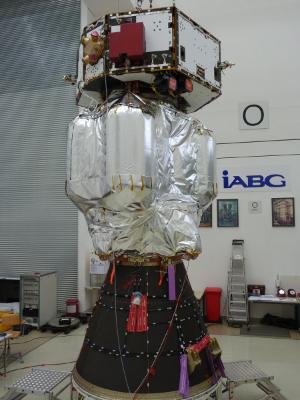 announced; this proposed that gravity occurs because massive objects - like stars and planets, deform the fabric of space - something called "spacetime" - and this deformation draws bodies together and explains why Newton's apple fell on his head. One of the other predictions of Einstein's theory is that gravity should ripple through the fabric of space - at the speed of light - producing "gravitational waves". And this week the European Space Agency launched the first phase of mission called e-LISA in which, ultimately, several space-craft out in deep space will bounce a light beam between themselves to spot any gravity waves that come through. Glasgow University's Harry Ward is one of the mission scientists and spoke to Chris Smith...
announced; this proposed that gravity occurs because massive objects - like stars and planets, deform the fabric of space - something called "spacetime" - and this deformation draws bodies together and explains why Newton's apple fell on his head. One of the other predictions of Einstein's theory is that gravity should ripple through the fabric of space - at the speed of light - producing "gravitational waves". And this week the European Space Agency launched the first phase of mission called e-LISA in which, ultimately, several space-craft out in deep space will bounce a light beam between themselves to spot any gravity waves that come through. Glasgow University's Harry Ward is one of the mission scientists and spoke to Chris Smith...
Harry - Gravitational waves are a bi-product of Einstein's theory almost exactly 100 years ago when he explained that gravity is not a magical force; it's a manifestation that matter curves space time and the curvature can change and the changes can propagate away from a source, and that's what we call gravitational waves, and we want to detect those because it will provide a new window on the universe, a new way of looking at astronomical events. And the way the gravity waves affect you, or me, or anything is that they stretch and squeeze us, by fortunately an infinitesimal amount but, nonetheless, by an amount that we hope will be detectable. And the way we plan to do it is to measure between separated items, typically mirrors because we are using laser light to do it, and we monitor their separation looking for tiny, tiny changes.
Chris - Bouncing between the mirrors is what - a beam of light?...
Harry - A beam of laser light, yes.
Chris - And you're able to detect, obviously, if a gravity wave comes through and it squeezes the space a little bit or stretches the space a little bit, then the light will take a bit longer or a bit less time to go between the two and, therefore, its colour, its wavelength is going to change very subtly.
Harry - That's right. Provided you've got some reference against which to make that measurement. And so in all of the experiments to date, we typically do that by having two arms, two paths along which we make measurements and we orient them at right angles to each other, because it turns out that a gravity wave affects two things at right angles to each other, and so the two arms gives us a natural way in which we compare one arm with the other arm.
Chris - Now this is the longer term project isn't it? Your initial work is going to inform how that happens, so what are you actually putting into space now and what's that going to do?
Harry - The longer term project is a thing called e-LISA which would have three spacecraft forming these two arms, or maybe even three arms if we if we complete the triangle, but the challenge is in the technology. I mean it's a daring thing to try to do and so, it's a proof of principle; it's designed to allay risk and to demonstrate to all of us that we have the technology under control.
Chris - I sound like an on-line sales rep when I ask "well what's in the box then?"
Harry - Essentially, two reflecting masses which float completely freely. They look beautiful actually; they're gold platinum cubes and these, in principle, float freely within a spacecraft and the laser beams propagate to and from these proof masses and make the measurement.
Chris - Will the test device - pathfinder device - actually have a capacity to do science or will it just prove that you can stably mount this system in space?
Harry - It's prime target is technology demonstration; it's not science. It was never sold as being a science mission, and remember it's not just a technology demonstration for something like e-LISA. There's a growing interest in making these kind of sensitive measurements of interaction of gravitational fields with masses much more locally. I mean we have missions that do climate research by monitoring the gravity perturbations of the Earth, and so the technology that's demonstrated for this mission has wider applicability than just for pure science.
Chris - Now say it does come off - we hope it will. What will it mean to science if we actually do detect these gravity waves going through space?
Harry - Well, I actually hate the word detect because that sounds as though it's a one thing and then it's over. Genuinely this is new astronomy plus also, you know, test of some of the remaining Einsteinian predictions of general relativity. It allows us to see right to the heart of some of the most extreme events that you could ever imagine in the universe. The millions of solar mass black holes that we know that exist at the centres of galaxies. Things that we couldn't realistically ever hope to see through the electromagnetic observations, so gravity waves allow, if we can observe them, is really a tool for seeing to the heart of, essentially, the force that shapes the evolution of our universe.
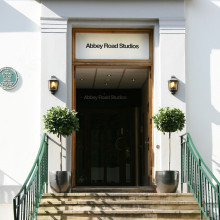
24:32 - Abbey Road, where startups start
Abbey Road, where startups start
with Jon Eades, Abbey Road Red
Recently, the iconic Abbey Road Studios made famous by the likes of Pink Floyd 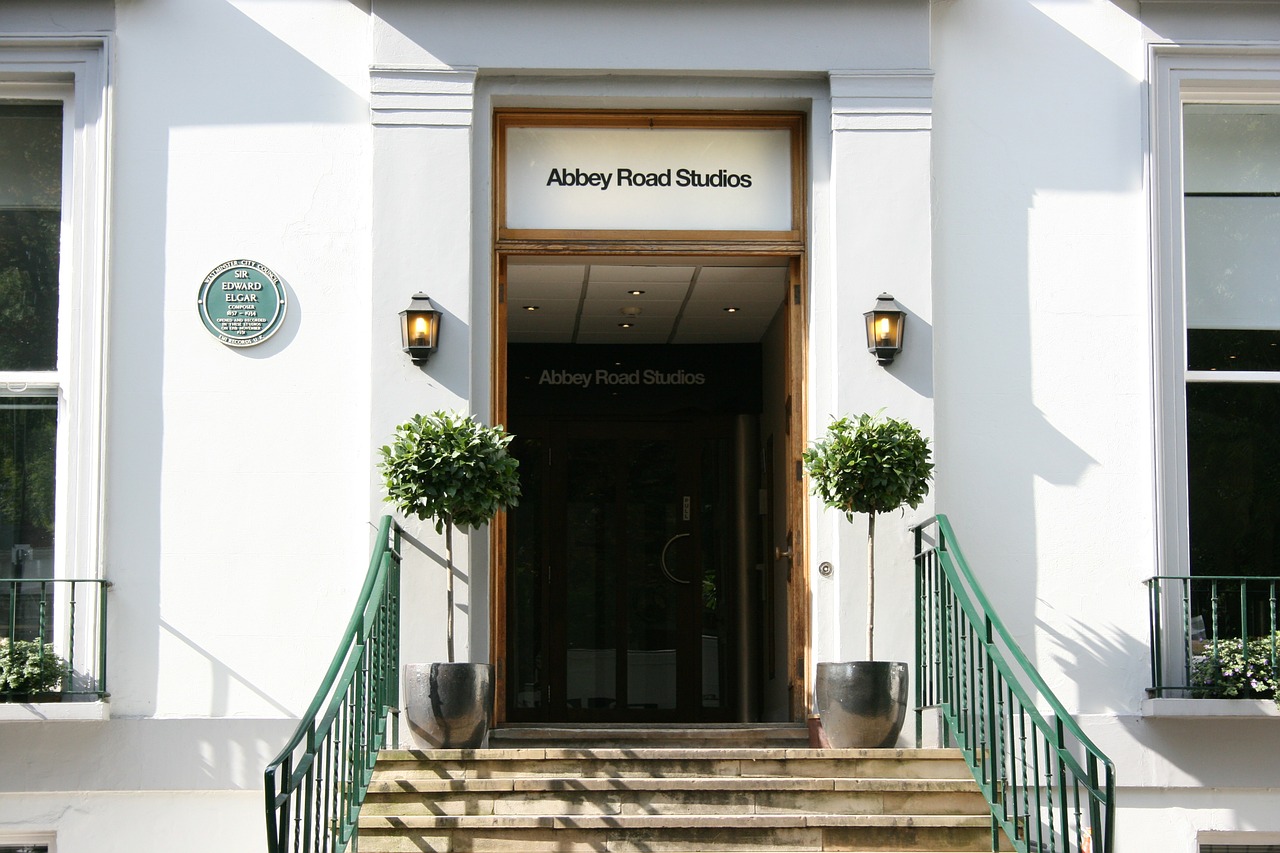 and The Beatles, launched Abbey Road Red. This is a new incubator for music technology startups. Chris Smith spoke to project manager Jon Eades who explained what a startup incubator is...
and The Beatles, launched Abbey Road Red. This is a new incubator for music technology startups. Chris Smith spoke to project manager Jon Eades who explained what a startup incubator is...
Jon - I guess incubator is actually not a bad term for it. It's kind of lost a bit of meaning for me recently but I guess, if you think of an incubator as somewhere where you put an egg or a new born baby or something in the early stages of its life to give it the best chance possible, and an incubator for startups really does the same thing. It provides the right type of habitat for a startup to have the best shot at success.
Chris - What sorts of people are approaching you and coming to take part in the incubator.
Jon - People, like I say, in the very early stages of building a business. Some people with just an idea; some of them very crazy; some of them more promising and right through to people who have built a bit of a team - up to kind of 10 or 15 people. But that's all really quite early in terms of how big some of these businesses can grow.
Chris - Technology and music go 'hand in glove' and 'hand in hand', they have done for years. So what's new here?
Jon - I very much see it as a progression or continuation of a progression which has been going on for a long time, and Abbey Road's been around since 1931 so there's 84 years of history there, and I'm lucky enough to have spent quite a lot of time researching that history. And what I see happening at the moment is very much just the continuation of how things have been progressing for a long time. The only difference for me really is how quickly it's moving and things are really, really accelerating in pace and you can point to a few quite large socio-economic changes that have caused that or allowed that to happen.
Chris - So, why have you moved back into this scene? Abbey Road was big in this area historically, then there was a bit of a fallow period. Now you're back. Why?
Jon - Some of those big economic changes have meant that we've played a different role in the change in technology over the years and, in the 50's and 60's, you couldn't go to a shop, you couldn't just buy a tape machine off the shelf and it was very much the seedlings of therecording studio industry. And EMI, the company that owned Abbey Road; built all of its own equipment. As things changed, as more independent studios cropped up and as independent producers came along, lots of independent companies started making equipment, and competing quality, and competing price. So EMI stopped producing quite so much equipment through the kind of 70's/80's period, and things have changed recently such that it's not so much the big established companies that are making the best technology now, or pioneering the best innovations. It seems to be that they're coming from either academic research or from the startup community and so we're not now running and R and D department in the way that we used to, we're more running collaborative agreements with the people who are innovating at the moment.
Chris - Is everyone on board with this encroachment of the new technology into the music scene or have you some people who in the same way as regard the teasmade as bit of a threat to the kettle? Is everyone on the same page?
Jon - No, I'd be kind of innocent if I said they were and I'm very much the kind of pioneer at Abbey Road. Abbey Road still does what it's always done and does a very good job of it - large scale acoustic recordings, and a lot of the people involved in that process see some of the things that I'm working on as quite threatening, and in some ways they are but in some ways they're not and, for such a company as Abbey Road, the worst thing to do is to ignore these technologies. and the best thing to do is to really get on board and embrace them.
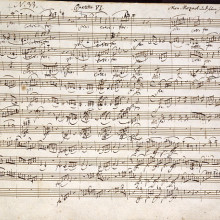
28:44 - 20 second music maker
20 second music maker
with Patrick Stobbs, Jukedeck
Can technology and creativity exist together? When we think of music that creativity is often associated with the first sparks of a song and the initial  composition of melody, beats and pitch. But could a machine do that instead? Patrick Stobbs is a musician and co-founder of JukeDeck, a new system launching this week that uses software to make music...
composition of melody, beats and pitch. But could a machine do that instead? Patrick Stobbs is a musician and co-founder of JukeDeck, a new system launching this week that uses software to make music...
Patrick - We're a London based startup. We are building an artificially intelligent music composer. A system that allows video creators, podcasters and any other content creators to create unique music at the touch of a button. We're not launched yet, but we're launching very, very soon. For you, we will give you a little bit of a sneak preview but within weeks this will be available.
Connie - Fantastic. Okay will you show me how it all works?
Patrick - Sure. You simply come to our site, click new track and select your genre of music. We offer four or five genres, electronic, folk, rock, ambient. Then you select your mood, so let's select and electronic genre, lets select a chilled mood. You can select your speed, you can select your exact duration. Let's just go for 27 seconds and click create and, in the next 20 seconds, our system will create a completely unique track of music based on your specification.
Connie - Electronic chilled. Not bad for 20 seconds but what else could I make? Five genres; electronic, folk, rock, orchestral and ambient and four moods; uplifting, dark - sounds intimidating, chilled and aggressive. What do you see aggressive being used for?
Patrick - This has actually been a really key request from some of our users. There's a large community of people in the world who shoot videos of themselves playing computer games and they've requested slightly more hard, harsher sounding music because they think it really goes well with playing computer games. So that's why we created an aggressive genre.We are about to release at least ten, or twenty or so more moods.
Connie - Can I try making one myself?
Patrick - Please do.
Connie - Okay, so I want to make a whole new podcast. It's going to be about adventures in Siberia. Okay, so I think I'm going to want some folk for my adventures in Siberia. My adventures are going to be - they're going to be uplifting and for around 20 seconds. It's just going to be a short intro. Hey, let's click and make it... And just another 20 seconds later... Nice I can really hear my podcast developing with this. I've got a real picture of how it's going to work...
Patrick - Rustic Siberia...
Connie - So Patrick. This seems really easy but I'm assuming there's something a lot more complicated going on behind it all to get out so many different types of music so quickly? Can you explain to me what's going on?
Patrick - Correct. This sadly isn't a system that you can just throw together in a week. It's taken four years of hard technical development. Broadly speaking we have two sections to our system. One is a composition section which dictates what notes should come where - imagine it's writing a piece of sheet music. Second is a production system which takes that sheet music and chooses how it should be performed. It selects instruments, it selects how notes should be articulated and eventually it converts the piece into an mp3 file which is then given to you.
Connie - Doesn't it make you - I don't know - cry a little inside when you suggest that a computer can do what a highly trained musician could?
Patrick - We're composers, we're musicians. We totally get some people's instant reaction which is "Ah, that's really weird. Why are you getting a computer to write music?" But I think if you dig a little deeper, it quickly becomes apparent that it's going to be a really useful and hopefully exciting thing. Firstly, composition is a really restrictive practice, unless you've had the really good fortune to have had a musical education or had the time to teach yourself, you basically can't create nice music. You can bang on a table and shriek and scream but composing a nice piece of music is really hard and most people can't do that. So we think that by empowering non-musicians to create music at the touch of a button, that can only be a good thing.
The second thing to bear in mind is the possibilities this opens up. When you have a system that can create music, it can necessarily do so very quickly because computers work incredibly fast. And it leads to a situation where music can be composed in real time, i.e. on a second by second basis, dynamically reacting to what is going on in the world. So this will, theoretically, be able to compose music that takes into account who you are, where you are, what you're doing, how you're feeling. For example, say you are trying to get to sleep, a system like this could, theoretically, take into account your physiology, what's going on inside your brain and compose you the perfect piece of music to lull you to sleep.
Connie - Do you think this is a tool that composers could use themselves in the end?
Patrick - We've already had musicians use this to create bigger and better works. We've had various pop singers come along, create a backing track using our system, and then compose their own melody over the top of it and that's really exciting to us as musicians. So absolutely we want bake in a bunch more features to help musicians create bigger and better works of art using this system.
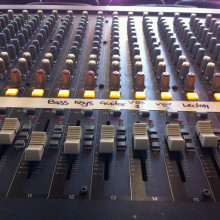
35:05 - Computers takes on producers
Computers takes on producers
with Dr Josh Reiss, Queen Mary University of London
Technology has long been part of music production, but now researchers at 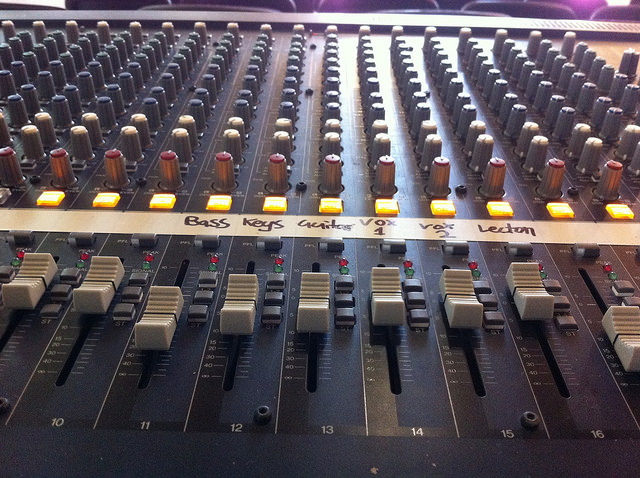 Queen Mary University of London are taking it one step further, replacing producers all together. They gave us two pieces of music, one put together by a machine and one by a person. Dr Josh Reiss talks Chris Smith through the process, starting with the role of a producer...
Queen Mary University of London are taking it one step further, replacing producers all together. They gave us two pieces of music, one put together by a machine and one by a person. Dr Josh Reiss talks Chris Smith through the process, starting with the role of a producer...
Josh - Typically with any audio production task, there's lots of different sound forces coming in and so the role of the producer is to combine those sources in such a way that it produces a nice clean blend of all of the sounds, while at the same time ensuring that everything can be heard, and heard intelligibly. So what the producer does is record all of the content and mix it together applying a variety of effects to adjust the levels, and adjust the relative strengths of each of the frequencies and the loudness ranges for all of the sources.
Chris - And that's what you've done with those two sample tracks that we played just now?
Josh - Yes. So it's a team of researcher working with me and, essentially, they've developed a variety of different algorithms or software techniques that will listen to all the incoming content and the interaction between all of these different sound sources, and make judgment calls of how to apply the effects on each of them.
Chris - Now the pieces I played you, you don't know which order I played them in? What order do you think I played them in? Which do you think was the human and which do you think was the machine?
Josh - Yes. So I thought I knew but now I'm not so sure. I think it was the second one that was the machine and the first that was the human.
Chris - Actually you're the wrong way round. So your system must be really very good because it's even fooling you?
Josh - Oh right. Yes, yes that surprises me a bit. So that's the goal of our system to do something sufficient quality that it can be used in situations where a mix can't be done or can't be done quick enough, or to provide very good pre-sets for someone to enhance even further.
Chris - One thing that this system won't do though is to bring to the party the creativity, the spontaneity, and the thinking outside the box that a really very good producer would. This is a computer programme which means it follows rules.
Chris - That's exactly right, although we have looked at ways in which those rules can continue to learn and adapt but, when we've evaluated the system, we've often found that different components will consistently yield a pretty good mix of the content. Whereas the human might create and amazing mix, or one that some people love and some people hate. And so it's all these artistic and creative decisions that we're not doing but we are able to deal with the technical aspects and, some of those technical aspects, because we can do all of this processing we might be able to do even better than a human.
Chris - I mean we were asking Jon this earlier with respect to how the traditionalists at Abbey Road are receiving the incursion of new technology into their domain. How is this going down with the pros? If you show a pro producer your platform - invite them to play with it, how do they react?
Josh - Jon and I have had discussions about this before. So, as an example, there was a write-up about this work in the New Scientist a little while back, and in the online discussion forum about it, one well known record producer - who of course I'm not going to mention - said "a complete waste of time and money." And another one wrote "I can't believe you even thought this rubbish was worth printing." So some producers do feel threatened by this like happens with any disruptive innovation technology, but another one, who's won several Grammys for his work said "Am I in favour of technology that may one day put me out of business? Yes I am, as long as it's done well."
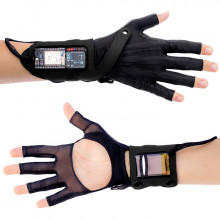
39:35 - Gesture controlled electronic music
Gesture controlled electronic music
with Adam Stark, Mi.Mu Gloves
So far we've heard how technology can influence the creative process, but what  about the world of live music? How are artists integrating technology into their acts? One musician, Imogen Heap, has been collaborating with textile designers, engineers and computer scientists on a project called Mi.Mu gloves. Connie Orbach went to meet Adam Stark who is one of the team...
about the world of live music? How are artists integrating technology into their acts? One musician, Imogen Heap, has been collaborating with textile designers, engineers and computer scientists on a project called Mi.Mu gloves. Connie Orbach went to meet Adam Stark who is one of the team...
Adam - My name is Adam Stark and I am a software developer and I've been working on the Mi.Mu gloves now for about four years trying to turn all the rich data we get about your hand into music. At the moment, if you want to make electronic music you're normally presented with a midi keyboard, or some buttons, or nobs, or faders, but they're not very expressive ways of performing electronic music. The thing that's really, really expressive about people, more than anything, is their hands and so we wanted to make a device that catches the expressiveness of your hands and uses that as a controller for making electronic music.
Connie - I feel like the best way to explain this is if you let me have a go. Is that possible?
Adam - Sure, I'll talk you through it.
Connie - Okay. Fantastic, what do we need to do first?
Adam - So, the first thing we need to put the gloves on and then we need to calibrate them for your hands because everyone's hands are different.
Connie - The gloves are black, thin and feel very fragile, but actually they're incredibly sturdy and designed specifically to be strong, flexible and unobtrusive. They're wireless and even fingerless so you can play other instruments whilst you wear them but, most importantly, they're covered in electronics.
Adam - Through your fingers, there are either one or two bend sensors, depending on the finger and this detects the bend of your knuckles.
Connie - Okay.
Adam - So if you just feel the end of your fingers you'll feel something hard there.
Connie - It's like a kind of ribbon running down my fingers and that's a flex ven sensor.
Adam - Yes, that's a ven sensor. This part here, this little bud on the wrist detects the orientation of your hands - well it's actually of your wrist - so it detects the roll of your wrist, and if you move your wrist up and down or from left to right.
Connie - And that's all of the sensors on the glove?
Adam - So, in terms of the information going into the those are the two things; the bend of your fingers and orientation of your wrist, but we have a couple of pieces of feedback as well. So we have an LED here which will light up; we can programme that to tell you different things about the software so you really don't have to look at the screen. And on the wrist here we also have some vibration measures that buzz. We can also use those to tell you that certain things have happened or not happened.
Connie - After a bit more fiddling to get the gloves in place it was time to configure the software to my hand.
Adam - The first thing I'm going to do; I'm going to press calibrate and you're just going to move your hand open and closed and make sure you're moving all of your fingers including your thumb from fully bend to....
Connie - Okay, so clench them like a fist and then open them back out.
Adam - It's now finding all of the extreme points of your hand and where your hand moves to and what the greatest extent and minimum extent of it is.
Connie - Once the software knew the extent of the movement in my hand we could programme it to gestures. So Adam got me to make a few different movements, like a fist or a pointed finger, and the software remembered them so it could later match them to particular musical commands.
Adam - So what I've set up here is a way for you to play chords using the gloves. If you make a fist with your right hand that will play a certain chord and if you let go, it will stop.
Connie - Okay.
Adam - Now if you move it to a different direction, make a fist, it will play a different chord...
Connie - Ah, this is so exciting. So I'm moving my hand say in front of me, above my head, to the side and down.
Adam - There should be one over this side as well, just to the left.
Connie - To my left as opposed to my right.
Adam - So if you make this one again in front of you. Now move on your left hand. So the right hand here is now making a fist. So on the left hand if you roll your wrist while you make a sound. You control the tone of it there.
Connie - Wow! I have so much power in my hands right now. I had so much fun playing with gloves. I can't imagine what someone with actual musical abilities might be able to do.
Connie - Of course, I was far too distracted to manage an actual interview so sadly the time came when I had to take the gloves off and get back to work.
Adam - We allow you to combine together different movements. You might say, if I'm making a fist and I'm rolling my wrist from left to right, that particular movement I'm going to connect to a certain musical control perimeter. So, when I say that, what I mean is we connect it to some piece of music software, maybe it's the volume fade or maybe it's the panning around the room or it's the amount the reverb.
Connie - So there were originally, I guess, a tool for Imogen but you have many other people using these gloves as well. Is that right?
Adam - That's right. We realised there was something really, really powerful in these gloves and that every time we gave them to somebody different to put them on, they used them in a completely different way. We were really interested in how other people might use them and so we've now got about 20 different users around the world and they're using it for all kinds of different things. We've got film composers, we've got Ariana Grunday who's a sort of pop star, and we've got a charity called Drake Music who work with musicians with disabilities that are barriers to them making music. So they use technology to try and break down those barriers, and we're working with a musician called Chris Halpen and he's been making huge use of the gloves and gigging all over the place. He has cerebral palsy and he's had a journey through dealing with his condition and trying to find ways around his condition to make music, and I think the gloves for him have been somewhat of an emancipation.
Connie - There's a lot of performance involved in wearing these gloves. You really have to be willing to throw your hands around and play with it, so I guess there's only a certain type of performer that would be happy doing this as well?
Adam - I think that's a really good question. I'm a guitarist and I play in band where you normally tend to look at your guitar pedals and that kind of thing, and suddenly you're not looking at your guitar pedals, you're looking up at the audience and you're moving your hands around, and it's a very different experience. Sometimes I really love it and sometimes I feel a bit like a lemon. It does take a certain personality, but it does communicate to people better, I think, than almost anything else.
Connie - I'm not sure that I'd feel comfortable flailing my arms around on stage but maybe that's why I'm not a performer. That, and the whole musical ability thing but, with these gloves, there seems little doubt that technology and creativity are hand in hand.

46:17 - Is streaming killing music?
Is streaming killing music?
with Nate Lanxon, Bloomberg
We've talked about how technology is changing music itself but what about the  music industry? Downloading and streaming have led to a huge drop in the amount of money a musician can expect to make from album sales, but is this an opportunity of a dead end? Nate Lanxon is a technology journalist at Bloomberg and he joins Chris Smith to explain.
music industry? Downloading and streaming have led to a huge drop in the amount of money a musician can expect to make from album sales, but is this an opportunity of a dead end? Nate Lanxon is a technology journalist at Bloomberg and he joins Chris Smith to explain.
Nate - Digital technology changed things in that it allowed people to buy and download individual songs and albums rather than having to go out and physically buy the CD. What streaming has done is change the business model once again to mean that instead of having to purchase individual albums or songs, you are now simply paying for access to the entire history of recorded music, or at least available recorded music. And that's meant that while there's a predictable, steady, stream of revenue and money coming in, there is less incentive for people to go out and buy something just because it's new and you've heard it somewhere on the radio or on television.
Chris - Cynics would say that "in the good old days" what artists tended to do was to make you buy an album by putting one or two choice morsels songs on there and then a whole load of other stuff that could, in some cases, be described as a bit of padding. Whereas with streaming and with download technology you listen to what you want to and you pay for what you want to buy.
Nate - Yes, it's put the access into the hands of the users because now they don't need to go out and pay £10 to see how much filler there is on an album. They can just sample the songs and the other side of it is that it's not just necessarily the new stuff that people are listening too and able to sample. If they're listening to a recording that someone says is heavily influenced by something that came four decades before, then they can go and listen to the thing that was four decades earlier and get a sense for that. And I think that generally that is a great thing for music and kind of democratises the history of all recorded music.
Chris - Can you give us some idea of the scale of the impact that this had had in money terms on producers, record companies and artists.
Nate - People are migrating to paying for streaming services and that has meant that, in some parts of the world, the money that is being made from streaming has exceeded the money made sales of downloads, which has in itself exceeded the sales made from CDs now for a long time.
The problem is how that money then gets distributed because there are many stories of songwriters saying that they earn very, very little from their recordings and that you can stream a song, or have a song streamed millions of times and make only a few thousand pounds or dollars from it, even from the very top performing artists. The issue is that the record labels are not necessarily distributing the money made from streaming services to artists in a way that the artists consider fair. And the knock-on effect there means that you get artists saying we don't want our stuff on streaming services because we don't make enough money from it.
Actually it has been shown in some areas that money is being made off their music; it's just that they're not receiving it because that side of the business world has not sorted itself out quite quickly enough.
Chris - I suppose it's fair to say that in the same way that the internet has disrupted multiple business models; newspaper publishing, book publishing and so on. It's broken the business model that had existed for decades and supported and sustained the music industry where there was a well-established system of; someone recorded your music, they helped you distribute it, they made money, you made money, and not everyone was a winner but it worked. Now we've got the system where on the one hand there's the internet being a great leveller. It gives opportunities to people who would never have those opportunities normally, they get visibility, to a vast audience potentially which they couldn't have done before but, at the same time in doing so, they've removed and destroyed the very thing that incentivises people to get into the industry in some respects - a financial reward - in the first place.
Nate - Yes, absolutely and I think that the other thing that's happened in a positive way is that there are now more places for music to appear. We have the world of video games and we have apps that are using recorded music in them and it's given people another way to consume music and, therefore, another way for artists to make money off their music. So it's a squeeze box; it's a boom and bust model that we're seeing the music industry go through. It's just that not all parts of the music industry have boomed or busted at exactly the same point; had they have done that would have been a lot better for everyone, possibly.
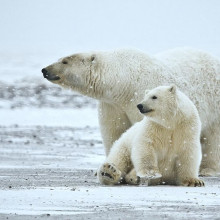
51:10 - Would polar bears thrive in Antarctica?
Would polar bears thrive in Antarctica?
Felicity Bedford spoke to Dr Iain Staniland from the British Antarctic Survey to find an answer to this chilly challenge...
Ian - Starving Polar bears desperately clinging to lumps of melting ice is an image that most people relate to regarding global warming and the threats to wildlife and, given their iconic status, it has even been suggested we could save the polar bear by translocating them to the Antarctic.
Felicity - But would they more successful hunting at the South Pole? Let's drop them in and find out.
Ian - Polar bears would do very well if transplanted into the Antarctic - well at least for a few years. From a food point of view it would be polar bear heaven. In the Arctic the seals and other potential prey species have evolved lifestyles that minimises their risk of being eaten by polar bears but, in contrast, larger Antarctic animals such as seals and penguins have evolved without the risk of being eaten. Because of this the penguins are typically quite bold and inquisitive and will often approach you to have a look, and seals in the Antarctic range in behaviour from total indifference to outright aggression. For example Antarctic fur seals have a reputation for chasing and trying to bite people, and whilst this is great for tourism and researchers - well except for getting bitten obviously, it would make Antarctic wildlife the equivalent of an all you can eat buffet as far as Polar bears are concerned. The most obvious effect of putting polar bears into the Antarctic would be a catastrophic decline in the seal and penguin populations and some very fat and happy bears.
Felicity - So far so good for the polar bears, although news isn't so good for the penguins. Are there any other benefits for polar bears in Antarctica?
Ian - Given that most of the industrialised nations are in the northern hemisphere and are encircling the Arctic, it's no surprise that polar bears are basically being poisoned by their food. The remoteness of Antarctica and its greater separation from these sources of pollution means that whilst such toxins abound in the environment, the levels are currently much less significant.
Felicity - Plenty of food and less pollution. This all sounds too good to be true..
Ian - But it's not all good news for the Polar bears, there are also several less obvious factors that come into play. There'll be many unknowns such as the risk of the bears of the exposure to new diseases, and then what would happen when the bears have eaten all the seals and penguins? History teaches us that animal translocations often have unpredictable results and so it's probably best that polar bears and penguins only meet on badly designed Christmas cards.
Felicity - Thanks Ian. I'm sure all penguin lovers will agree, the solution to Polar bear conservation lies in protecting their Arctic habitat, not moving them south.









Comments
Add a comment